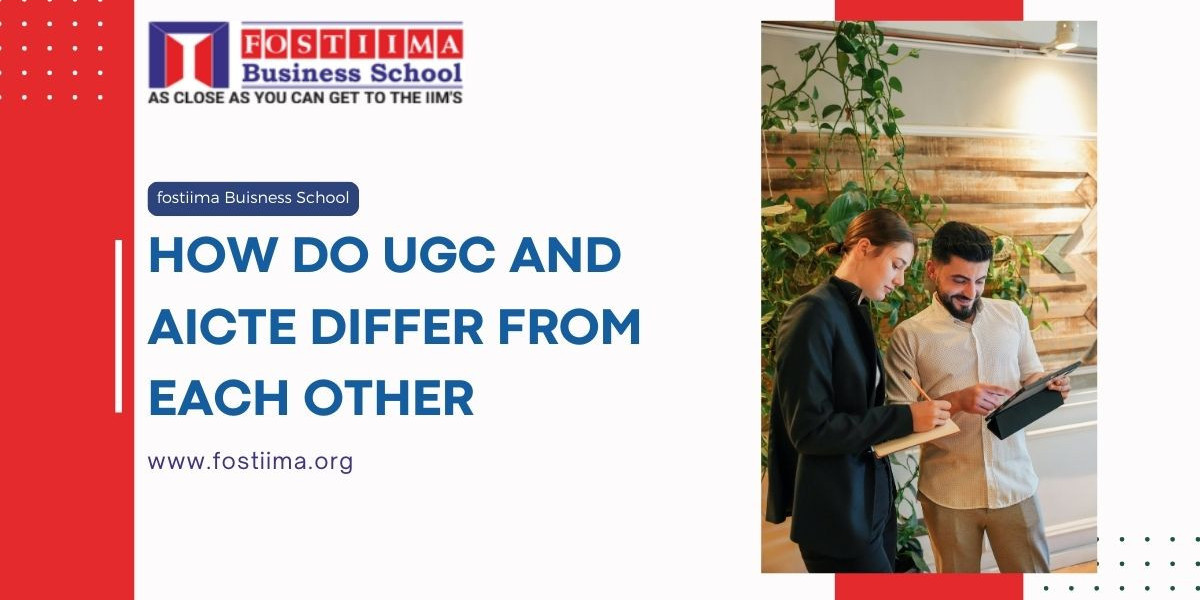For students, especially those hoping to pursue higher education in India, it is imperative that they comprehend the distinctions between the University Grants Commission (UGC) and the All India Council for Technical Education (AICTE). The nation's higher education system is governed and maintained in large part by these two statutory authorities. But they address various facets of education and have different functions. This blog will examine the differences between AICTE and UGC, concentrating on the ways in which these variations affect establishments such as FOSTIIMA Business School.
Regulating Academic Standards and Universities: UGC
Under the direction of the Indian government's Ministry of Education, the University Grants Commission (UGC) was founded in 1956. Coordinating, deciding upon, and upholding higher education standards throughout India is its core duty. The following is part of UGC's mandate:
University Regulation: The UGC is in charge of accrediting universities and makes sure they follow the government's stated standards for academic excellence. It is in charge of bestowing upon institutions that satisfy certain requirements the designation of "deemed-to-be university."
Grants and Funding: Universities and colleges might receive grants from UGC to help with their financial needs. These monies support faculty development, research, facility development, and other academic endeavors.
Curriculum Creation: In order to guarantee consistency and quality among schools, UGC is essential in formulating standard curriculum for a range of courses.
Assurance of Quality: The UGC makes sure that colleges uphold excellent academic standards by means of organizations like the National Assessment and Accreditation Council (NAAC). Higher education that has earned NAAC accreditation is of the highest caliber.
Observation and Assessment: UGC keeps an eye on institutions to make sure they follow its rules. In addition, it assesses university performance and, if required, makes corrections.
The Technical Education Regulator, or AICTE
Dedicated to promoting technical education in India, the All India Council for Technical Education (AICTE) was founded in 1945. It is run by the Ministry of Education's Department of Higher Education. One of AICTE's duties is to:
Regulation of Technical Institutions: Organizations that offer technical degrees in engineering, management, pharmacy, and architecture are approved by the AICTE. It guarantees that these establishments fulfill the necessary requirements concerning staff, curriculum, and infrastructure.
AICTE is in charge of giving technical colleges accreditation and authorizing new course offerings. For an institution to offer technical programs, AICTE permission is required.
Curriculum Development and Revision: To keep up with industry demands and technological changes, AICTE updates technical course curricula on a regular basis.
Promotion of Research and Innovation: Through a number of programs and projects, the AICTE promotes research and innovation in technical education. It encourages student entrepreneurship and offers scholarships for research projects.
Monitoring and Enforcement: The AICTE keeps an eye on how technical institutes are performing and takes appropriate action when there is a violation of
The Case of FOSTIIMA Business School
The Delhi NCR-based FOSTIIMA Business School (FBS) is an illustration of how an institution is impacted by both AICTE and UGC requirements. Under the auspices of AICTE, FBS provides Post Graduate Diploma in Management (PGDM) programs. FBS must get AICTE accreditation since it offers a technical program in management and needs to make sure that the faculty, curriculum, and facility all match the appropriate criteria.
Conclusion
In the Indian education system comprises two unique bodies, AICTE and UGC, each with a particular role. AICTE is in charge of technical education and the accreditation of technical schools, whereas UGC is in charge of overseeing universities and guaranteeing academic standards. For establishments such as FOSTIIMA Management School, AICTE is essential to preserving the caliber and applicability of the education they offer. Comprehending these variations facilitates students' and institutions' navigation of the intricacies of Indian higher education and enables them to make well-informed decisions on their academic and career paths.



